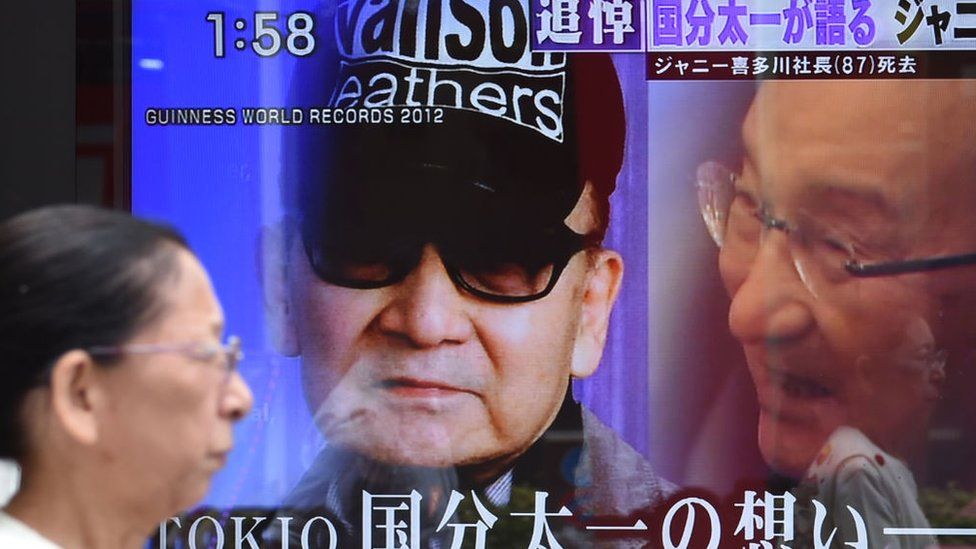Johnny Kitagawa's sexual abuse: Japan's worst kept secret
- Published

For the first time, Julie Fujishima, the niece of the late Johnny Kitagawa, has acknowledged the sexual abuse committed by her uncle and stepped down as president of Japan's most powerful talent agency, the firm he founded.
Is there a sense of shock here in Japan? No, there isn't.
It's more of a sense that "everyone knew, but no one did anything about it and now it's finally all out in the open".
For decades, these sexual assault allegations hovered over Kitagawa - those who tried to speak out were stopped. They were up against a giant of the entertainment industry and all the litigation his empire could bring.
Remember, some of the allegations were proven in a civil court, but he was never charged.
Johnny Kitagawa was a sexual predator. He was also a star-maker and a mentor to the biggest names in the J-pop scene here: he had power, success and the dreams of hundreds of young boys in his grasp.
If you were a Japanese teenage boy who wanted to make your way into the industry, this was the "unspoken price for stardom", as one article put it.
One victim featured in the BBC's documentary, Predator - The Secret Scandal of J-pop, said that he was told to "put up with it" if he didn't want his career to suffer.
This was a man that was feared and revered by his talent.
Many of Friday's newspapers have the new boss Noriyuki Higashiyama's picture on their front pages.
One headline said "My 'father' Johnny's sexual abuse". Mr Higashiyama has described Johnny Kitagawa as a mentor, saying: "He was like a father to me."
In a news conference on Friday, J-pop star Kauan Okamoto, who revealed after the BBC documentary aired in March that he was abused by Kitagawa when he was 15, said that while he hated his actions, he had "no hate in my heart for Johnny", adding that he was grateful to him "for introducing me to the world of music".
"I know some would say this is grooming, but this is how feel," he told reporters.
For decades, sexual assault accusations have marred Kitagawa's career - and for decades, most of the media failed to cover the allegations.
The exception to that was the Bunshun Weekly which wrote about it in 1999.
In a lunchtime talk show on TBS channel, a journalist spoke about the need to examine not just the culture in the talent agency, but also the media practices that amounted to a cover-up.
"We have to ask ourselves why the media haven't touched this," he said.
You could argue that the answer is simple: power. Think of disgraced producer Harvey Weinstein at the height of his Hollywood dominance before he was convicted with rape and jailed.
Johnny Kitagawa held sway, not only over the talent at the agency, but also the channels clamouring to feature his bands and the advertisers who work with and pay the channels. The media and the entertainment landscape are intertwined, and Johnny Kitagawa was in command.
Japan's culture of shame and silence over sexual abuse is another factor in explaining why this went on for as long as it did - and on such a grand scale.
In Japan, women can face a backlash when they speak out about sexual violence committed against them.
Now, take that and add multiple layers of complication, caused by same-sex abuse by an older powerful man against young boys desperate to be in the limelight and be in his good books.
It's hard to tell how this will affect Japan's entertainment industry. So much needs to change at the J-pop talent agency that is seen as the bedrock of boyband culture here.
But the company's attempt at a "new page" hasn't had a promising start. Mr Higashiyama, the new boss, is himself facing questions about alleged sexual misconduct.
His response to the allegations was: "I don't remember clearly. Maybe it happened, maybe it didn't. I have trouble remembering."
And while Julie Fujishima has stepped down, she still owns 100% of the shares and is staying on as the representative director to oversee the compensation of victims.
One major thing remains the same: the company name. Much to the surprise and dismay of many victims, who have commented that it's insulting to keep it after what they've been through.
Johnny and Associates may once have been synonymous with entertainment and Japan's J-pop culture - but now this is a disgraced brand named after a man responsible for Japan's biggest sexual abuse scandal.
Related Topics
- Published7 September 2023
- Published8 September 2023